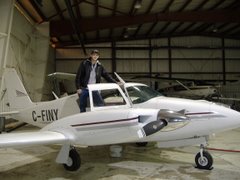Flying is certainly a very specialized skill. But it is unique in that in that very specialized activity of commanding an aircraft, a very broad area of other skills and education is required. Even more so many of these skills are more then basically covered. Academically a pilot is taught and must understand (for the most part) applied physics which includes aerodynamics, meteorology which could in some cases be described as fluid dynamics. There is also mechanics/engineering, practical mathematics, geography & navigation, communication, and even psychology. Flying is even a study of art. What can show more self expression and skill then massaging an aircraft down for a "picture" perfect landing, or an aerobatic pilot making the sky his canvas?
It has also been long recognized that many valuable life skills can be taken away from inside the airplane. Pilots learn good decision making, hand-eye coordination, critical thinking, safety consciousness and the importance of being prepared. Much of the hands on life skills are easy to understand, but much of what is taught academically to a pilot can be very easily taken for granted. Much of what pilot's are taught is geared towards some sort of practical application, but in many cases the practical application can only make sense after the theory is understood.
Groundschool even for Private Pilots include almost every aerodynamic scenario an aircraft will encounter. Did you know that during a climbing turn an aircraft's inside wing is experiencing different aerodynamics then an aircraft's outside wing? Aerodynamics in a descending turn are different still. The theory behind radio waves is covered as well. In the meteorology side of things, would-be pilots are taught everything from the theory behind cloud formation and predicting what altitude they will form at, to the intimate differences of the weather at a warm front versus a cold front.
Pilot's are also expected to be able to perform on-the-fly (pardon the pun) mental calculations. One excercise, diversions, requires a student to map out a previously unplanned route to a new destination, accurately estimate the distance, calculate the heading to fly, the time it takes to get there, and a halfway point - using only a map and a pencil, while flying the aircraft! That can take some mental gymnastics when the mind is already occupied with flying.
Student pilot's even dabble in human behaviour. They learn the brain's natural decision making process and how our attitudes affect our decision making. They also study how human's communicate and how communication can often breakdown or be misinterpreted. Pilot's who will be working as part of a crew learn all about interpersonal dynamics and behavioural awareness.
Learning the skills of modern aviating is more then just air law, a bit of weather, and learning which buttons to press and how to manipulate the controls of an aircraft. The interesting thing about flying is that it draws from almost every major area of study out there. While a pilot's license won't give you a Phd in any subject, it is certainly an eye opener to the practicality of studying them.
I think sometimes I sell myself short to the skills and knowledge I've learned. The transferable skills gained from learning how to flying are countless. Aviation has taught me more then just how to fly a plane.
Subscribe to:
Post Comments (Atom)




Aviation sure is the way to go if you want to pick up a lot of information about a little bit of everything. I've learned most of what I know about how engines work from flying. Systems - aviation. I've never truly specialized in anything - I've always wanted to learn different things. Aviation fulfills that desire to learn a lot of different ideas and tie them all together.
ReplyDeleteSo, does one have to be academically inclined to be a good pilot? Or put in another way, does an academic (ie. book smart)with the same skills as a non-academic make a better pilot? Should I ask to see a resume of my pilot before I get on the aircraft?
ReplyDeleteGreat Article. I think it will give a good insight to lot of people who are aspiring to be a pilot.
ReplyDeleteAnnie Bankss
Private Pilots Secrets
Great post! In answer to Norm, I think it takes longer for academically-inclined people to become good pilots. Or at least this was my experience. Here in Australia the recommended education level for PPL is Year 11 and Year 12 for CPL. Won't get you a PhD that's for sure :-)
ReplyDeleteAcademia rewards finding things out by yourself and creativity. No place for such things when flying an airplane. A large part of the training is about making sure that, when faced with a given emergency situation, you won't improvise but will apply the procedure that got drilled into you throughout your flying training. There's a lot of unlearning required when going from an academic mindset to a pilot mindset.
Another thing I found hard is that, as a pilot, you need to know when to stop asking why things are the way they are. Flying training will not turn you into an airplane designer. You will learn enough about why planes are designed the way they are so that you understand how the plane you happen to fly behaves, but nothing beyond that. Have a look at a flight manual, it's purely about how to fly the airplane, no mention of the design philosophy behind it.
I see that as a bonus for academics: flying training takes you out of your intellectual comfort zone and challenges you in directions academia does not.